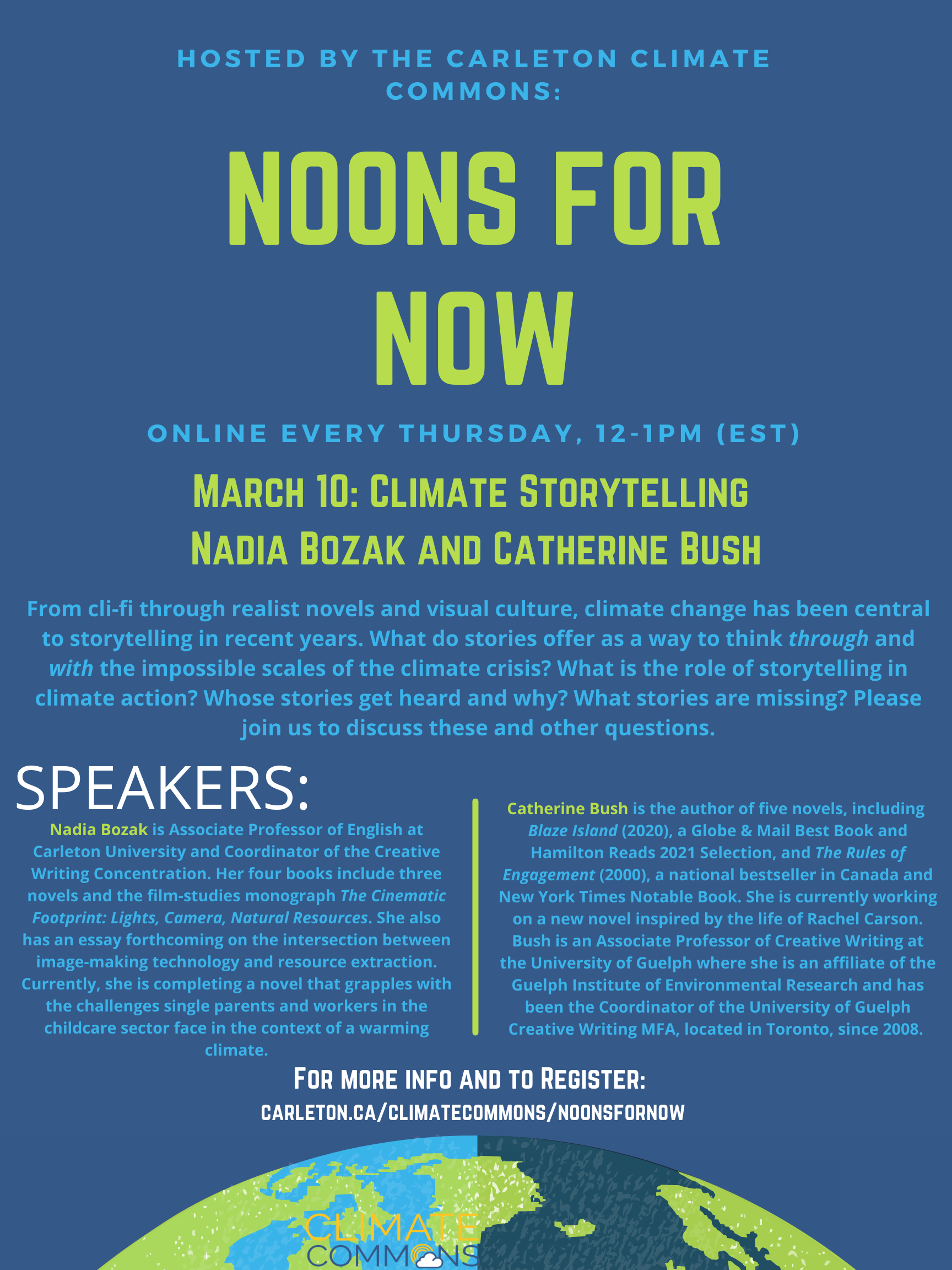
Manifesting. Exploring. Advocating.
Storytelling as a Guide Through the Climate Crisis
Storytelling does not always require reading a book or speaking to an audience; it can be talking to others about personal experiences or stories heard through the grapevine. Everyone should recognize and share what is known or unknown regarding the climate. What is learned or not yet figured out in the world has a place in the conversation about the climate crisis—even if the conversation is messy. “Messiness has a place in addressing the climate crisis,” said Barbara Leckie during last Thursday’s Noons for Now. Carleton’s Professor Leckie made introductions to the topic of storytelling amidst the climate crisis with conversations by guest speakers Carleton’s Professor Nadia Bozak and Guelph’s Professor Catherine Bush. The exchanges in experiences and opinions during the teach-in between the professors and other students and faculty members revealed social and political benefits to messy, casual, and formal climate storytelling. In talking about stressful topics, one can find peace inside and in navigating the stresses of the climate crisis, especially since by doing so, we “make the invisible, visible,” as Professor Bozak said. By the end of the meeting, there was agreement on the importance of maintaining relevancy and empathy in climate conversations. More people should be engaged in the critical conversations needed for advocating for the health of the planet and its inhabitants. However, it does not always have to be daunting, and as quoted by Professor Bush, “What we think, we become” (Buddha).
written by Emma Cantlon
Emma is a first-year student at Carleton University pursuing a Bachelor of Arts Honours in Political Science. Emma entered politics to study the role of government in the climate crisis, and specifically the effects and possibilities of globalization in tackling climate change. Their focus outside of school is finding and testing eco-friendly alternatives to miscellaneous necessities and advocating for the importance of individual efforts in dealing with the climate crisis.
Resource List
The following is a list of resources recommended by attendees at our event.
Sarah Jaquette Ray, A Field Guide to Climate Anxiety: How to Keep Your Cool on a Warming Planet, 2020
Catherine Bush, Blaze Island, 2020
Kate Rossmanith, “Ditching the New Yorker Voice,” Sydney Review of Books, 2022
How Do We Know? Because IPCC, graphic novel from succession
The Beast: Making a Living on a Dying Planet. Expanded Digital Edition, Written by Nicole Burton and Hugh Goldring, Edited by Patrick McCurdy.
On the Centrality of Storytelling:
Thomas King, The Truth About Stories: A Native Narrative, 2008
Amitav Ghosh, The Great Derangement: Climate Change and the Unthinkable, 2016
Sylvia Wynter: On Being Human as Praxis, Ed. Katherine McKittrick, 2015
Chapter 2: “Unparalleled Catastrophe for our Species? Or, to Give Humanness a Different Future: Conversations“
Comedy and Climate Storytelling:
Beth Osnes, Max Boykoff, and Patrick Chandler, “Good-Natured Comedy to Enrich Climate Communication,” 2019
Baroness von Sketch tackles climate-related issues on a number of episodes, here is one example on corporate responsibility.
Sachs, Aaron. “A Different Kind of Wildness: Environmental Humor and Cultural Resilience,” The Thoreau Society Bulletin, 2019.
Noticing and Climate Storytelling:
Nadia Bozak, The Cinematic Footprint: Lights, Camera, Natural Resources, 2011.
Micro-Climate Stories project at the Guelph Institute for Environmental Research
Gustafson, A., Ballew, M., Goldberg, M., Rosenthal, S., & Leiserowitz, A. “Personal stories can shift climate change beliefs and risk perceptions: The mediating role of emotion,” Yale Program on Climate Change Communication, 2020
Catherine Bush, “Invasives: Unknitting Despair in a Tangled Landscape,” Emergence Magazine, 2021